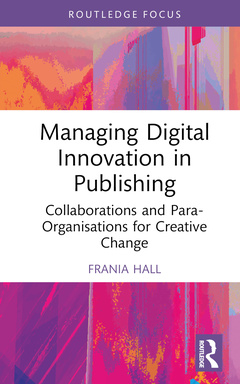Description
Managing Digital Innovation in Publishing
Collaborations and Para-Organisations for Creative Change
Author: Hall Frania
Language: English
Subject for Managing Digital Innovation in Publishing:
· 13.8x21.6 cm · Hardback
Description
/li>Contents
/li>Readership
/li>Biography
/li>
Reflecting proactively on a growing industry 'dilemma', this book explores how publishing businesses can and do successfully experiment and innovate in digital publishing through collaboration.
Many sectors of publishing are still structured around print production, with digital innovation in the consumer arena generally focused on different book formats, such e-books and audiobooks, rather than on brand-new types of products. Publishers need to innovate around different sorts of content and digital formats as consumers change their media habits. However, their pricing, business and risk models, and workflows are reflective of a legacy of print publishing; and as print commands so much revenue, publishers do not want to derail their main business as they experiment. Drawing on an analysis of collaboration and network theory and four in-depth qualitative case studies in different sectors, this research suggests that collaboration, particularly engaging with the wider creative sector, is key to the sustainable development of new types of products. It points to the characteristics of a successful digital collaboration and explains how to manage publishing innovation alongside the existing business, through para-organisations. Considering novel approaches to innovation, such as iterative software-style approaches and agile project management, as well as new business models, such as those employed in games development, the author shows how introducing new people ? from software developers to competitors ? can help instill a collaborative mindset within the organisation and facilitate constructive experimentation.
Managing Digital Innovation in Publishing will be of interest to upper-level students and researchers of (digital) publishing and related creative industries.
Chapter 1: Introduction: digital innovation and publishing research
Chapter 2: The structure of publishing organisations
Chapter 3: Managing publishing as a creative business
Chapter 4: Mapping collaboration theory and creative collaboration
Chapter 5: Network theory, creative industries and publishing
Chapter 6: Collaboration: formation, operation and outcomes
Chapter 7: Collaboration: structures, networks and ecologies
Chapter 8: Conclusion: para-organisations and collaborative mindsets
Index
Dr Frania Hall is Senior Lecturer and Course Leader for MA Publishing at the London College of Communication (LCC), University of the Arts, London. Based at the School of Media, she teaches undergraduate and postgraduate students of publishing. Prior to this she worked for 20 years in a variety of publishing sectors, most recently as Publisher with Thompson. Her research centres on digital publishing, creative collaboration and entrepreneurial networks as well as zines and participatory community publishing. She is author of The Business of Digital Publishing, now in its second edition.




